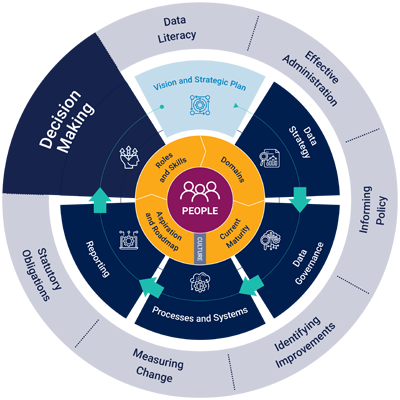Decision making
How effective decision making plays an important role within the data maturity framework.
Who owns decision making?

All members of staff need information to make decisions, some strategic, some administrative.
Team leaders define decision making responsibilities, promote the use of reporting and empower individuals.
The executive/senior leadership teams champion a culture of engagement with data assets through their sponsoring of the institutional data strategy and the utilisation of strategic reporting.
The importance of decision making
Decision making in this context is the use of reporting outputs to gain value from data assets, realising investment in people and software. It is enabled by strong data literacy and a culture of accountability.
Data needs may include:
- Process - efficiently completing administrative activities (for example student enrolment, student assessment).
- Statutory – accurately fulfilling obligations (for example FOIs; Institution and subject level returns).
- Improvement – identifying issues to address (for example cohorts disadvantaged by the curriculum structure).
- Policy – agreeing long term direction (for example diversifying student numbers or research income).
- Performance – setting suitable metrics to track improvements (for example organisational key performance indicators, functional performance indicators).
For value to be realised:
- Users of reporting need support to deliver the analytical requirements of their role, through access to software, training, advice and guidance.
- Senior leaders need visibility of the levers that drive change. Which activities drive key priorities? Is the data needed to understand and improve these captured effectively? Where it is not, this should inform data strategy development, completing the data maturity circle.
Decision making and data maturity
In mature institutions and colleges, everyone has access to the information needed for administrative and statutory activities. Data in a core reporting offer is trusted, suitable for varied skillsets and preferences, and can be used with confidence. Analysing information to help find opportunities and to influence strategy is encouraged and supported.
Senior leaders embrace analysis to understand the direction the organisation should take, and performance indicators use leading metrics that reflect activities that can be assessed and improved
In less mature institutions and colleges, individuals personally store data to ensure they have information they trust to deliver their roles. Leaders are not clear who to approach for reporting, they may not understand what is available to them, and there is a tendency to ask for more rather than assess what is already available, delaying decision making.
It may not be clear how decisions are made, or which roles are responsible for making them, making it difficult for reports to deliver to the right audience. Performance metrics are in place to meet governance requirements but do not steer priorities – there may be too many, or they may not reflect the day-to-day actions needed to make improvements.
Culturally, there is little visibility of data capability across the organisation. Some individuals describe themselves as “data geeks” and while they may have good technical skills, they can lack awareness of business requirements, despite the dependency others have on them.
Decision making themes
We have divided decision making into the following six thematic areas.
Administration
The availability of operational reporting to support process delivery.
Data literacy
The capability of teams to work effectively with reporting products.
Identifying improvements
The availability of management information and its use in enabling decisions.
Informing policy
The availability of insight that enables the university, college or provider to change or innovate.
Measuring change
The processes to monitor performance.
Statutory obligations
The resourcing and support for regulatory requirements.
The maturity journey
Embarking on any change activity is challenging, particularly in the highly devolved environments common in the FE and HE sectors.
The data maturity framework is copyright Jisc and made available under CC BY-NC-ND. Find out more about using content from the data maturity framework.